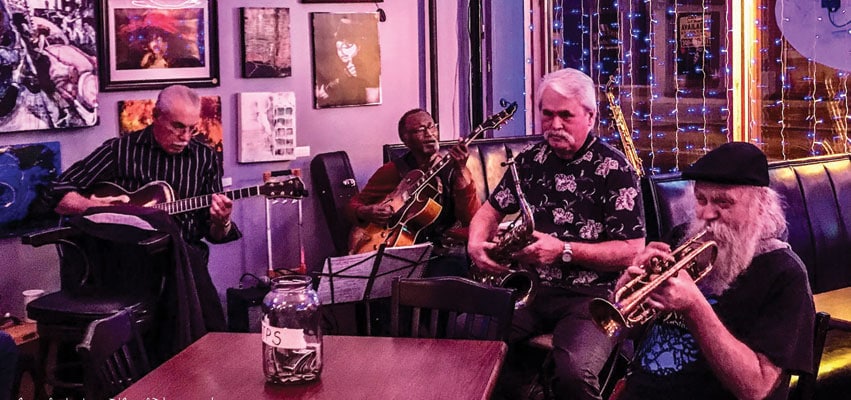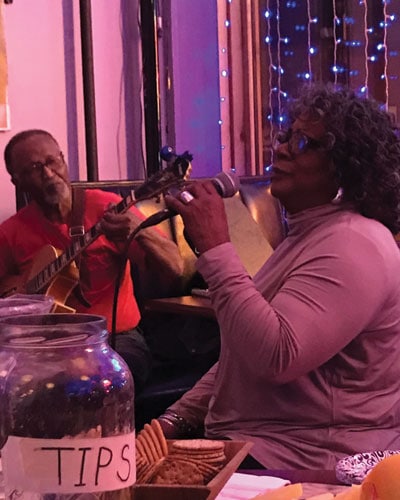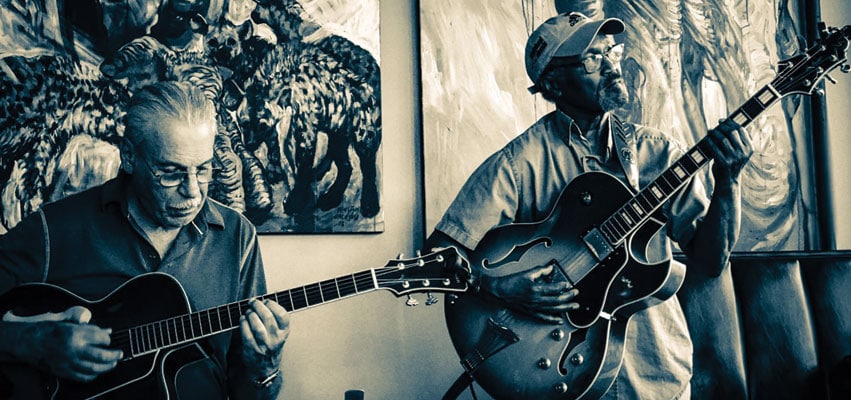At the corner of Main and Sheridan in Peoria, you’ll find Broken Tree. From the outside, the place is unassuming… save for a few neon signs, its tinted windows obscure what lies within. Inside this neighborhood café, you’ll find yourself surrounded by brilliant, colorful paintings and the distinctive aroma of pizzas baking in the oven. And every Tuesday, a revolving cast of characters gathers for what’s become a weekly ritual: jazz nights with John Miller and Preston Jackson.
Response to Life
“I started playing guitar when I was nine,” Miller says, seated in a booth by the window. It’s Tuesday night at Broken Tree, and he’s waiting for Jackson to arrive. “When I was 19, I snuck into Birdland on Main Street and heard a rhythm-and-blues group… and it blew my mind!” he recalls of that transformative moment. “I couldn’t get the songs out of my head.”
Miller began teaching guitar as a teenager. In his early to mid-20s, he played endless gigs as music became a full-time career. When famous performers came through the Peoria area, he would team up with local acts like the Bill Hardesty Band, serving as a backup guitarist. When he got married at age 27, he put his music career on hold. “Then in the ’90s I went back to playing a lot while I was still working my day job. And I’ve been playing ever since.”
Today, Miller performs regularly—both solo and in some of Peoria’s finest jazz groups, including the Boss Trio (Miller on guitar, Mike Nellas on keys, and Jason Brannon on drums) and the Romaniacs (Miller and Joe Park on guitar, Andy Crawford on bass, and Larry Harms on sax). Although he and Jackson had played the odd gig together over the years, they never really teamed up until a few years ago.
“We were going to do it for one night… just for kicks. People liked it, so we just kept doing it,” Miller recalls. Pausing, he looks up. “Here comes Preston!”
As Jackson takes a seat, Miller continues. “Between the two of us, we have about 130 years of guitar playing. Can you believe that? I mean, that’s a big number! It’s freaky.”
“I believe it! I’ll believe anything,” Jackson laughs. They begin talking about their last gig, which took place in a church. “Everyone in the house was listening… and that’s unusual. We got to speak to each one directly in our own language.” Turning to Miller, he adds, “I’ve never heard you speak that well. It’s like you’re a philosopher, too!”
“Well, we were playing in a church,” Miller shrugs. “I used to know a minister who had a book about what prayer is… It’s a radical response to life. Well, we respond to what happens to us by playing—or like you do with your other art,” he says to Jackson, who’s also a prolific painter and sculptor.
“If something good happens, we turn to the art. If something bad happens, we turn to the art,” Miller explains. “No matter what happens, we’ve got to express it. Because if we didn’t, people like us would be locked up.”

Reminiscing on the Funk
Talking back and forth, the two men often anticipate each other’s sentences—their stories interwoven as effortlessly as their music. “I met Cab Calloway,” Jackson pronounces.
“I did, too,” Miller responds. “I played with him at the Shrine [Mosque].”
Jackson sits up in disbelief. “That’s when I met him! After the gig!”
“I played that weekend,” Miller affirms.
“We saw him walking down the street by himself. My wife and I said, ‘Cab! Do you need a ride? This is a bad neighborhood!’ And he was stumbling, you know,” Jackson says, shaking his head. Though the legendary jazz showman was known to forbid his band from using drugs, both men recall another side of Calloway, which they both witnessed that night in Peoria.
The conversation shifts, and Miller tells Jackson about the time he met Duke Ellington. “He was playing at the Shrine Mosque. He went to Peoria Musical to look at sheet music, and I walked up to him and said, ‘Duke?’ And he goes, ‘Yeah!’ And it was like meeting Jesus,” Miller recalls. “I saw a halo around the guy! I swear… he was the most charming human being I ever met. He was just smooth and elegant… happy and glowing.”
“Wow,” Preston says breathlessly. Soon they’re exchanging stories about Buddy Rich (who they both agree had a terrible personality), Bob Hope (a “sweetheart of a guy”) and Tom Jones (a ladies man of diminutive stature).
Asked when they first met, the two men let out a long, collective exhale. “1968,” Jackson finally answers. “He was playing in Champaign with [Bloomington jazz pianist] Tom Becker… so I went down to hear his group.”
“We both crossed or ran into the chitlin’ circuit,” Jackson continues, referring to the network of venues where African Americans could safely perform in the era of racial segregation. “You don’t have to be on [the circuit]… If you cross its path, you catch the funk,” he remarks pointedly to Miller, who nods.
The “funk” he describes is their shared experience of the jazz, rhythm and blues scenes some 50-plus years ago. “We couldn’t play the blues at certain times. I mean, after 12 o’ clock… because of the danger,” Jackson reminisces. “Guys carried guns.”
Here in Peoria, the two men recall one particularly memorable character, “an old bass player and welder” named Geirude Crockett. “He used to carry a greasy brown paper bag, and he’d say, ‘I got my fried chicken in here.’ Well, he also had his pistol in there,” Miller says, laughing.
“It was life,” Jackson notes with a shrug. “I could tell you stories that would make your skin crawl. How they shot up the place in Champaign… how a big fight broke out in Centralia. Bottles throwing across the room, back and forth—big family feuds.”
“I was playing in Oklahoma one night and a guy got shot and killed right in front of me,” Miller says. “Man, the tempo of that tune sped up! We started playing really fast. They came up to us and said, ‘Keep playing until we get this under control!’ If there was ever a problem, you kept the music going—because once the music stops, everyone gets involved in the fight. Luckily we don’t have to do that stuff anymore.”

Universal Language
In contrast with those tumultuous gigs, Miller and Jackson now spend relatively tranquil Tuesday evenings playing guitar at Broken Tree, and their rapport is a beautiful thing to watch. They never coordinate a set list—they just show up and play. “It’s not contrived at all. We haven’t rehearsed it,” Miller explains. “We both love it.”
“I try not to step on his toes because I know how advanced he is,” Jackson says. “And he knows that I have a pretty good memory of melodies.”
“He can play melodies better than anybody,” Miller quickly interjects. “So I want to play what fits behind the melodies, you know.”
“It’s like tai chi! Every bone in the body… movement, dance. Tai chi is like the dance of life. And music is like that,” Jackson observes. “It’s all the same.” He speaks of music as a language, informed by experience, perspective and time. “If you play the blues, you catch the blues. If you play bebop, you get cool,” he asserts in Zen-like fashion.
Known internationally for his paintings and sculpture, Jackson was mostly a self-taught musician, though he did take a few lessons. At age 15, he started a group called Preston Jackson & the Rhythm Aces, releasing a pair of singles in the early 1960s. In the 1970s and ’80s he played with a wide range of bands, including Black and White, the Tony Zamora Jazz Ensemble and Kriss/Kross. He now leads Preston Jackson & Friends, a rotating who’s who of Peoria’s musical elite—many of whom occasionally sit in with Jackson and Miller on Tuesday evenings.
Asked about their musical influences, the two men rattle off a long list of names: Wes Montgomery, Django Reinhardt, T-Bone Walker, Barney Kessel, the Jack MacDuff Quartet… “And then I started listening to the gypsy players also… It changed my approach to playing a little bit,” Miller observes.
“Yeah, I can hear that,” Jackson agrees. “I can hear how your music has evolved.”
In his early days, Jackson worked with a guitarist from Philadelphia, a city which has its own distinctive jazz and blues sound. “You can always tell an East Coast player,” Miller notes. “The West Coast is cool and the East Coast is hot.”
And what about the Midwest? The question elicits a chuckle as the two musicians consider the answer. “If you go from here to Indianapolis, Chicago and Detroit… we have our own style of music,” Miller explains. “It’s real warm and engaging… it gets to people’s feelings. People get emotionally involved with it. It’s not so intellectual that they can’t understand it.”
Both men see their style of jazz as a dying art form. “The jazz we play came out of the types of clubs we came out of,” Miller elaborates. “Those places don’t exist anymore. The original jazz music came out of afterhours strip joints.”
“Gambling,” Preston adds with a sly smile.
“It was the ‘devil’s music,’” Miller continues. “It was fast. Drinking, gambling and carousing… Now those things are all gone. Jazz music has become an intellectual pursuit.”
Both men are quick to note that this type of jazz is still very good, especially from a technical standpoint—but it’s not the same. “Just compare it to flavoring food,” Jackson suggests. “Salt, bacon… all these things we can’t eat now. Back then, it was all thrown into the pot with the traditional herbs that were handed down from your grandparents. We used to call it the soul in Motown, but it’s even thicker than that. It’s like the roux in gumbo.”
“When we are gone, the music goes with us,” Miller declares.

A Treasured Tradition
Part of the charm of their Broken Tree gig, they agree, is the space itself. “We have characters here,” Jackson notes, as Miller chuckles knowingly. They admit they enjoy watching the people who show up on any given week. “He’s going to paint it someday,” Miller muses, motioning toward several of Jackson’s paintings that decorate the walls.
Both men stress they want everyone to feel welcome to come to their Broken Tree gigs. “We don’t look down our musical noses at anyone—we welcome them into our tunes,” Miller says. “It’s not a club. It’s not a cult. It’s not exclusive.”
“The people feel what’s going on when they come in here,” Jackson agrees. “I don’t know how to describe it, but the vibe works both ways… It works between us, to them, and then back to us.”
Broken Tree owners Jeremiah and Carrie Schmillen have enthusiastically accommodated the two musicians since their first gig several years ago. “Everyone loves jazz nights,” Carrie says. “It’s a great mix of all ages.”
And neither Jackson nor Miller have any plans to stop. “This is different from anything we’ve ever done,” Miller says. “It’s something about the combination of the place and the audience. I look forward to it.”
“It’s a bit like the old days,” Jackson adds with a smile. “It’s the best thing musically that has ever happened to us… and it feels good.” PM



